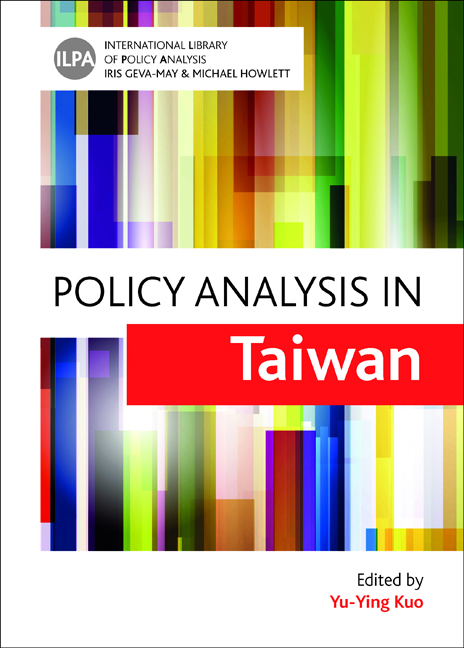Book contents
- Frontmatter
- Contents
- List of tables and figures
- Acknowledgements
- Notes on contributors
- One Policy analysis in a time of turbulence
- Two Exploring policy advisory committees in the central government
- Three Analysis of innovative local government policies in Taiwan
- Four Policy analysis in the legislative body: the legislative process of the Soil and Groundwater Pollution Remediation Act in Taiwan
- Five Policy analysis in the local councils
- Six Gendering policy analysis? The problems and pitfalls of participatory ‘gender impact assessment’
- Seven The power of influencing policies, or getting their share and more: interest groups in Taiwan
- Eight Think tanks in Taiwan
- Nine The development of public engagement in Taiwan
- Ten Social media and policy evolution in Taiwan
- Eleven Policy analysis by non-governmental organisations in Taiwan
- Twelve Policy network of universal healthcare reform in Taiwan
- Thirteen Public policy and administration research
- Fourteen Too critical to ignore? A tri-dimensional relationship examination of policy analysis internship in Taiwan
- Fifteen Policy analysis in Taiwan in an international perspective
- Sixteen Policy analysis education in Taiwan: a comparative perspective
- Index
Sixteen - Policy analysis education in Taiwan: a comparative perspective
Published online by Cambridge University Press: 11 March 2022
- Frontmatter
- Contents
- List of tables and figures
- Acknowledgements
- Notes on contributors
- One Policy analysis in a time of turbulence
- Two Exploring policy advisory committees in the central government
- Three Analysis of innovative local government policies in Taiwan
- Four Policy analysis in the legislative body: the legislative process of the Soil and Groundwater Pollution Remediation Act in Taiwan
- Five Policy analysis in the local councils
- Six Gendering policy analysis? The problems and pitfalls of participatory ‘gender impact assessment’
- Seven The power of influencing policies, or getting their share and more: interest groups in Taiwan
- Eight Think tanks in Taiwan
- Nine The development of public engagement in Taiwan
- Ten Social media and policy evolution in Taiwan
- Eleven Policy analysis by non-governmental organisations in Taiwan
- Twelve Policy network of universal healthcare reform in Taiwan
- Thirteen Public policy and administration research
- Fourteen Too critical to ignore? A tri-dimensional relationship examination of policy analysis internship in Taiwan
- Fifteen Policy analysis in Taiwan in an international perspective
- Sixteen Policy analysis education in Taiwan: a comparative perspective
- Index
Summary
Introduction
Public policy education, to some degree, shapes the direction and orientation of public policy development in theory and practice. The emphasis on good governance has aroused a lot of interest in examining current public policy programmes in many countries in recent decades (Geva-May and Maslove, 2006). Public policy and public administration education has been recognised as providing training in both academic and professional fields (Geva-May and Maslove, 2007). Existing literature concerning public policy education has involved in-depth case studies or cross-national comparisons. Although sharing many characteristics, the development of public affairs programmes in each country is highly influenced by different political contexts and regional cultures (Geva-May and Maslove, 2007). Most of the literature focused on the four big issues of public affairs education proposed by Robert Denhardt in 2001: (1) the development of public administration education; (2) the orientation of the training in Master in Public Administration (MPA) and Master in Public Policy (MPP) programmes; (3) the curricular designs of MPA and MPP programmes; and finally, (4) the future of higher education in public affairs.
This chapter attempts to understand Taiwan's public policy programmes in a comparative context and to provide an overview that identifies policy analysis in Taiwan in light of domestic and international developments. This comparative paper primarily discusses the orientation of Taiwan's public policy and policy analysis courses, curriculums and practices in East Asia, North America, and Europe.
Policy analysis in Taiwan's universities
The development of public policy education in Taiwan came along with the development of public administration, which can be traced back more than half a century to when Soochow University first established the Department of Political Science in 1954. As indicated in Table 16.1, the Central Police University built up the Department of Police Administration in 1957, which is related to public administration, though focused on the education of police leaders and their decisionmaking abilities. In 1963, two public universities, National Taiwan University and National Cheng Chi University, and two private universities, Chinese Culture University and Tamkang University, set up departments of public administration. National Taiwan University established the Department of Political Science with a public administration division.
- Type
- Chapter
- Information
- Policy Analysis in Taiwan , pp. 231 - 246Publisher: Bristol University PressPrint publication year: 2015



